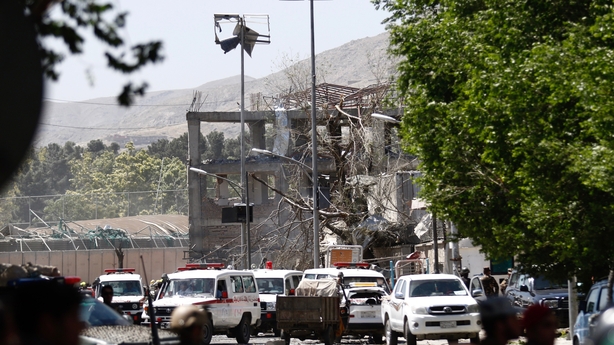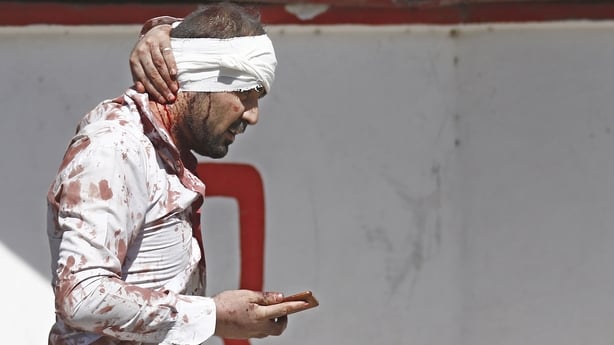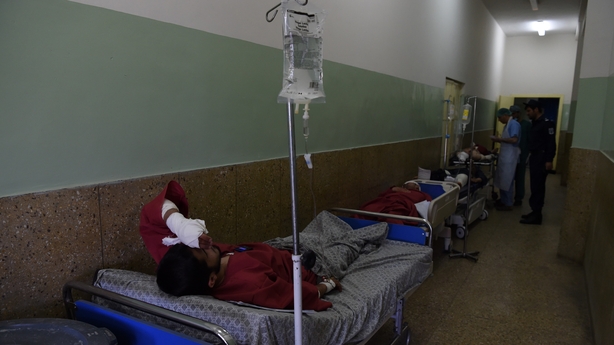A powerful bomb exploded during the morning rush hour in the centre of the Afghan capital this morning, killing at least 80 people and wounding hundreds.
The explosion, one of the deadliest in Kabul and coming at the start of the holy month of Ramadan, occurred close to the fortified entrance to the German embassy on a road usually choked with traffic at that time of day, said a spokesman for Kabul police.
The deputy interior minister said 463 people had been wounded in the attack
The BBC said among the dead were an Afghan driver employed by the broadcaster while four of its journalists were injured.
"It is with great sadness that the BBC can confirm the death of BBC Afghan driver Mohammed Nazir following the vehicle bomb in Kabul earlier today, as he was driving journalist colleagues to the office," the BBC World Service said in a statement.
"Four BBC journalists were also injured and were treated in hospital. Their injuries are not thought to be life threatening," the statement said.
Pope Francis has condemned the "abhorrent" bombing.
In a message to Afghanistan's embassy in Italy, the Vatican said: "Having learned with sadness of the abhorrent attack in Kabul and of the many dead and seriously injured, Pope Francis expresses his heartfelt condolences to all affected by this brutal act of violence."
The blast, which shattered windows and blew doors off their hinges in houses hundreds of metres away, was unusually powerful, with some reports saying it was caused by explosives concealed in a water tanker.
The victims appear mainly to have been Afghan civilians and there were no immediate reports of casualties among foreign embassy staff.
The French and Chinese embassies were among those damaged, the two countries said, adding there were no immediate signs of injuries among diplomats.
A statement from the NATO-led Resolute Support (RS) mission in Kabul said Afghan security forces had prevented the vehicle from entering the heavily protected Green Zone that houses many foreign embassies as well as RS headquarters, suggesting it may not have reached its intended target.
Employees at the German embassy were injured in the explosion and one Afghan security guard was killed, Foreign Minister Sigmar Gabriel said on Twitter.
"The attack took place very close to the German embassy. It hit civilians and those who are in Afghanistan to work for a better future for the country with the people there. It's especially contemptible that these people were the target," he said.
Black smoke can be seen coming from the site where a powerful bomb exploded in Kabul this morning pic.twitter.com/7aKJYqxpMI
— RTÉ News (@rtenews) May 31, 2017


Video shot at the scene showed burning debris, crumbled walls and buildings and destroyed cars, many with dead or injured people inside.
Both the Taliban and the so-called Islamic State militant group have carried out high-profile attacks in Kabul in recent months but there was no immediate claim of responsibility.
A spokesman for Taliban insurgents said he was gathering information.
However the attack provided another clear demonstration that Ramadan, which began at the weekend, would provide little respite from the violence across Afghanistan.
The Taliban have been stepping up their push to defeat the US-backed government and reimpose Islamic law after they were forced from power in a US-backed invasion in 2001.
Security and emergency services rushed to the site of the bomb in Kabul pic.twitter.com/FCAN11ndUa
— RTÉ News (@rtenews) May 31, 2017

Since most international troops withdrew at the end of 2014, the Taliban have gained ground and now control or contest about 40% of the country, according to US estimates, though President Ashraf Ghani's government holds all provincial centres.
US President Donald Trump is due to decide soon on a recommendation to send 3,000 to 5,000 more troops to bolster the small NATO training force and US counter-terrorism mission now totalling just over 10,000.
The commander of US forces in Afghanistan, General John Nicholson, told a congressional hearing earlier this year that he needed several thousand more troops to help Afghan forces break a "stalemate" with the Taliban.

